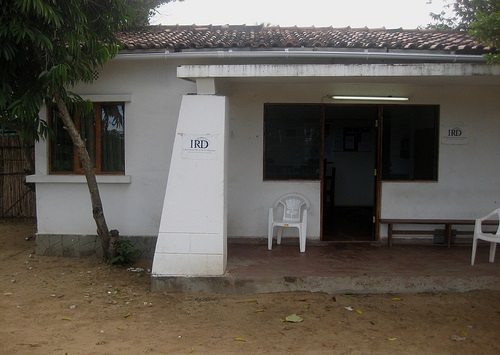
Image Credit: Ton Rulkens
January 27, 2015;New York Times
Saying that there was evidence that the firm had misspent government aid funding, USAID has suspended the Arlington, Virginia-based nonprofit, International Relief and Development, from future contracts, at least for the time being. In an examination of contracts awarded to IRD since 2006, USAID found “serious misconduct in IRD’s performance, management, internal controls and present responsibility.” The agency didn’t release specifics regarding the alleged mismanagement of federal funds.
This is noteworthy because IRD has been among the largest USAID contractors to this point and, by most accounts, the largest in delivering U.S. humanitarian aid in Iraq and Afghanistan. To its credit, USAID under the Obama administration has been much more diligent than in previous years in suspending contractors that violate the rules, issuing 25 times more suspensions since 2011 than the agency did between 2003 and 2007.
Sign up for our free newsletters
Subscribe to NPQ's newsletters to have our top stories delivered directly to your inbox.
By signing up, you agree to our privacy policy and terms of use, and to receive messages from NPQ and our partners.
The suspension of IRD didn’t come as a huge shock. The Washington Post had published a thorough and devastating critique of IRD’s performance. The Post’s investigative series was stunning and powerful, with plenty of eyebrow-popping revelations:
- The United Church of Christ minister, Arthur Keys, and his wife Jasna Basaric-Keys, founded the nonprofit in 1998, but made a lot of money out of the nonprofit, taking combined compensation of $4.4 million for their services between 2008 and 2012, though the Post’s announcement of the contract suspension the other day put the compensation figure at $5.9 million, plus another $1.3 million that went to their daughter and to Basaric-Keys’s brother. The Post added that for 2013, Keys was in line for $690,000 in salary and $900,000 put into his retirement account, and Basaric-Keys was to receive $1.1 million, including a $289,273 bonus.
- IRD gave 38 employees a total of $3.4 million in bonuses between 2008 and 2012.
- While getting little meaningful oversight from USAID during this period, IRD hired 19 USAID employees, giving IRD access and insight into the agency that was supposed to oversee the organization’s work. In every case cited, the IRD salary was significantly higher than the employee’s salary at USAID
- For people leaving IRD, the agency required some—at least 49—employees to sign confidentiality agreements, with specific language referring to IRD funders, such as the federal government: that the employee “will not make, or cause to be made, any derogatory, disparaging, negative, critical or defamatory statements, either orally or in writing, about IRD or an of its current, former or future directors, officers, employees, agents, attorneys or representatives to anyone including, without limitation, IRD’s current, former or prospective donors, funding agencies or recipients, contractors, subcontractors, consultants, program partners, competitors, officials of any government, the press or any other media…”
There is plenty more in the details about IRD, but the story is bigger and broader in a number of ways.
- Truth be told, the Washington Post’s May 2014 investigative series wasn’t the only critical commentary about IRD, with complaints about its on-the-ground performance in Afghanistan and Iraq going back years—and apparently well recognized in the halls of USAID. There was plenty of information warranting action on IRD for years.
- Despite the existence of various kinds of contractual oversight mechanisms in the federal government, including some created during the past couple of years within USAID, it seems that in this case, as in many, it was the investigative power of the press—in this case, the Washington Post—that prompted action. If this story doesn’t underscore the need for strong investigative units at newspapers, what will?
- Another truth: For whatever IRD might have done wrong, another dimension of the problem might have also been in the actual design of the programs themselves, especially the Community Stabilization Program in Iraq and Vouchers for Increased Productive Agriculture in Afghanistan, which were subject to multiple delays under IRD and charges that money was going from USAID through contractors to local groups to the Afghani militias—sometimes for use against U.S. forces there. Because the programs were questionable, that might have been the cover needed by firm like IRD to escape without sharp governmental action.
- Moreover, IRD typically worked not on contracts, but on “cooperative agreements,” which have less specific parameters, timetables, and benchmarks than contracts. Maybe that’s what a contractor working in conflict zones such as Iraq and Afghanistan wants, but it doesn’t help for effective government oversight.
- IRD was a firm, like others, that specialized in conflict zone activity. The federal government pays something of a premium for contractors willing to work in Iraq and Afghanistan and other conflict zones, not just including the extra contractual costs of security, but simply for the ability to recruit firms to work amidst great danger. Turning a blind eye to potential excesses on the part of a firm like IRD might have been part of the understanding in order to keep a firm there that was willing to endure the risks. That might not be acknowledged by federal oversight agencies, but the reality is that not many firms will consistently take on aid work in this region.
- The fact that IRD recruited and hired a bunch of USAID staff shouldn’t be surprising. That’s the name of the game with USAID: Hire experienced USAID “hands” and get insights into the thinking of the agency, the preferences of the field staff, and so forth that give a potential USAID bidder a leg up. Former USAID employees are not supposed to take part in programs in which they had responsibilities at the agency, and IRD said, like other contractors say, that these former staffers were hired for their “expertise,” not their “connections,” but that’s pretty hard to imagine, especially when some of those going through the revolving door were high-level USAID administrators.
- And the requirement of non-disparagement or confidentiality agreements is one that is hard for the nonprofit sector to criticize, as nonprofits around the country, especially bigger ones and foundations, are increasingly prone to do the same for their employees. It is a truly unfortunate trend in the nonprofit sector, one that IRD followed, though USAID’s inspector general for Afghanistan intervened after the Post report to declare the confidentiality agreements “null and void“ because they contradicted federal government protections for whistleblowers.
“IRD is a nonprofit in name only,” observed John E. Bennett, a former career State Department official and ambassador who knew IRD in the field. “They built an organization designed to get USAID money.” That, unfortunately, is what many USAID contractors are built for, particularly as they recruit high-level staff from USAID to serve as paid “senior advisors.” But again, the issue of the confidentiality agreements wasn’t acted upon until Senators Tom Coburn (R-OK) and Charles Grassley (R-IA) wrote after the Washington Post reports to complain about the agreements. Even this action by USAID suspending IRD seems to have occurred in the wake of a letter from Senator Bob Corker (R-TN) asking why IRD was still eligible for contract awards despite these allegations of wrongdoing.
The ultimate problem isn’t just IRD’s alone. It’s like all instances of nonprofit wrongdoing. When one group does something that gets itself rightfully hoisted by its petard, even if few or no other nonprofits are doing anything similar, the damage to the nonprofit sector’s reputation and trustworthiness is palpable and hard to erase. In this case, IRD’s long-awaited punishment may exact a toll on other, legitimate, competent, honest NGOs in the international aid community. Hopefully, USAID will make it plain that it is dedicated to rooting out other IRD lookalikes in order to undergird the credibility of the many NGOs that are doing their work honestly and accountably.—Rick Cohen












